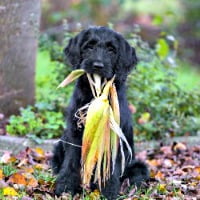Best Natural Chews for Puppies
Puppies love to chew, and although they're not too particular about what they chew ON, their parents usually are!
Decades of experience, and a lot of product testing by resident pups, has helped me figure out which are the best natural chews for puppies.
The enjoyment, mental stimulation and stress relief a puppy gets from all that chomping is huge, and since they tend to spend a LOT of time gnawing away on something, offering them the safest, and most natural chews just makes sense,
Luckily it's super easy to give your puppy natural chews, and often they're safest and tastiest option. There are lots of different types to choose from, and literally something (or several somethings) for every puppy!
Natural dog chews are good for your puppy
Natural puppy chews contain natural, healthy ingredients and many also contain essential nutrients that make they healthy as well as safe.
What they don't contain are artificial additives or ingredients, colors, dyes, chemicals and so on, this makes them a great choice for dog parents who are committed to giving their little Rascal the very best.
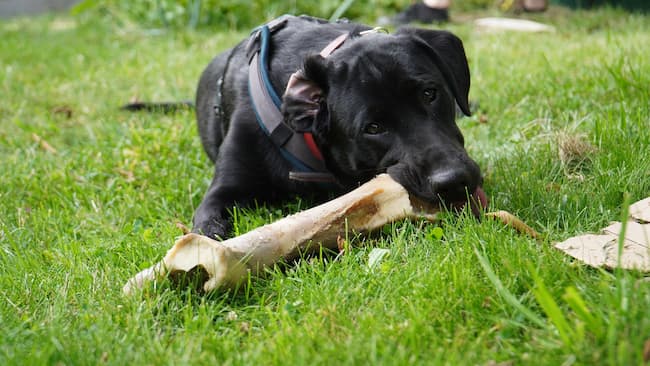
Many of the natural dog chews on this page because they are sourced directly from nature and from other animals, in a way that fits with a wild dog's natural prey and diet.
These single ingredient chews can include the bones, connective tissues, organs, or other body parts of a whole range of animals.
If you're wondering what you can give your puppy to chew that's natural, here are some of the different types of natural puppy chews:
- Yak milk chews
- Bully sticks
- Fish skins
- Ears - pig ears, cow ears and rabbit ears are all good
- Antlers (usually from deer, elk or moose)
- Horns (usually from sheep, goats or water buffalo)
- Dehydrated animal parts (includes beef trachea, esophagus, tripe and tendons)
- Root chews and chew sticks (made from roots tubers or wood)
- Natural bones
About Rawhide chews... while rawhide is a natural product, and there are many, many rawhide chews and toys on the market, it's not something I recommend or include on this page. You can find out more towards the end of this article (or skip right there if you want to know now)
Some of these natural treats make for a long-lasting chew, suitable even for an aggressive chewer or older/bigger dog.
Natural antlers, bones, and hooves are extremely durable, as are chew roots. Horns aren't quite as hard as antlers, but they're definitely not soft.
Others such as the bully/trachea sticks, ears, fish skins and dehydrated meat products are entirely edible, therefore they have a shorter life-span!
There are other types of chews for puppies that are made from natural ingredients and one of our house favorites are the Yak milk chews.
These healthy chews are hard, chewy treats that are both edible and fairly long lasting.
I have a German Shepherd and a mixed breed dog, both with incredibly powerful jaws, and both of whom are heavy chewers so tough, natural dog chews are a staple in our house (see our favorites here).
The ONLY natural chews that survive for more than a couple of hours in our house are antlers, bones, hooves and natural roots. Both boys also love bully sticks, pigs ears, fish skins and yak milk chews.
Chews and chew toys also play an important role in a dog's dental health by helping to keep their teeth clean and their gums healthy.
Puppies have other needs as well, because when they're going through the teething process (which usually happens between two and seven months of age) they have an even stronger need to chew because it helps alleviate the pain and discomfort they feel.
Best natural dog chews for teething puppies
All of the chews on this page are suitable, and safe, for puppies and dogs of all ages, including those who are teething.
Some puppies lose their baby teeth and grow in their adult teeth without batting an eyelid.
You may notice traces of blood on their toys and chews, or even find a lost tooth embedded in a toy, but otherwise teething is uneventful.
Other puppies experience more discomfort, or even pain, and become obsessed by chewing in an effort to make themselves feel better.
For those puppies, a slightly softer chew (firm, but with some 'give') is your best choice, because that consistency soothes teething woes better than a harder one.
My top picks for this would be:
- Bully sticks
- Fish skins
- Yak milk chews
- Root chews
Each one is a long-lasting dog chew that won't irritate a teething puppy's sore mouth.
Top 10 Natural Chews for Puppies
There are lots of contenders for this list, and you'll find a wide variety of chews here. Enough to be sure that there's something for every pup and every budget.
They aren't listed in any particular order, and each one has it's own pros and cons.
Yak Milk Chews
Yak milk chews are a naturally processed milk product that is hard, tasty and long lasting. It's actually a traditional Himalayan cheese.
They come in a variety of sizes, making them the perfect chew for puppies and dogs of all sizes and ages.

Yak milk is high in protein and the curing process renders it lactose free. Although yak milk treats contain some salt and lime juice, they are free from artificial preservatives or ingredients.
If you find the yak chew is a little too hard for your pup you can soak it in warm water for ten minutes or so to soften it up a bit for him.
These can be messy and sticky once chewing begins so they're best given somewhere there's an easy-to-clean floor.
Because a chewed-down-to-the-nub milk chew can be a choking hazard it's important to remove it from your pup's reach once that happens.
These are rich, so one or two a week is plenty (you might find one lasts you quite a bit longer than a week, or you may not... depends on the breed and chewing style of your puppy or dog!).
PROS
- Protein rich
- Calcium rich
- Durable and long lasting for most dogs
- Fully digestible
- Low calorie
- Low odor
- Won't splinter
- Appropriate texture for puppies and dogs of all ages
CONS
- Gets sticky/mess when wet
- Can become a choking hazard when chewed down to a nub
- As it's edible this won't last as long as an antler, bone, horn or other more durable chew
- Can cause tummy upset if eaten too quickly, or too often
Our suggestion: Choose a 100% yak milk chew like Raw Paws large yak cheese Himalayan chews or Shop yak milk chews now on Amazon
Bully Sticks
Bully sticks are a firm favorite when it comes to natural dog chews, and are safe and healthy.
What bully sticks are made from sounds unappetizing and a bit weird, but rest assured your dog won't have any reservations about them and will enjoy them wholeheartedly!
If I told you that another name for a bully stick is a beef pizzle it might give you a clue.

Yes, bully sticks are basically bull penises, but when you cut to the chase they're basically dehydrated beef muscle, which has been twisted, pulled and shaped into a long stick.
The best bully sticks are made from 100% beef and there should never be any artificial ingredients or additives. They're chewy, tasty, highly digestible and nutritious, plus they're safe for puppies and dogs of all ages and sizes.
Their initial cost is less than buying antlers, and similar to the yak milk chews. However a bully stick will disappear faster than the yak chews, and can't compare in any way to the longevity of antlers, horns etc.
PROS
- High in protein and contain essential amino acids
- Fully digestible
- Low fat
- Relatively long lasting
- Good chews for removing tartar and bacteria from the teeth and gums
CONS
- High in calories
- Get sticky and smelly once chewed (you can buy odor-free bullies though!)
- Have the potential to become a choking hazard if chewed down to a nub or torn/ripped
Our suggestion: Choose 100% single ingredient bully sticks. I prefer low-odor because whew, they can get stinky. My dogs aren't picky and are totally happy with low odor bully sticks, however some dogs prefer the ones that smell funkier!
Check out Sancho & Lola's odor-free bully sticks or Natural Farms odor-free bully sticks or shop all bully sticks now on Amazon.
Fish Skins
Although they're not one of the most well-known natural puppy chews, fish skins actually make one of the best chews for puppies, small dogs and seniors.

This is because they're relatively soft, easy to chew and are less likely to become a choking hazard than some of the other, thicker, tougher and more durable chews.
Of course the downside of this is that they are not as long lasting as the other options.
PROS
- Highly digestible
- Soft and easy to chew
- Protein rich
- Contain omega-3 fatty acids
- Very tasty
- Affordable
CONS
- Definitely can be smelly and get slimy and messy when chewed
- Don't last very long
Our suggestion: Choose sustainably sourced fish skin chew treats that are air dried and have no added ingredients or chemicals (either in ingredients or processing). My dogs prefer salmon skins but they can be a tad more expensive.
You might want to look at Icelandic Plus Cod Skin Chews, or my boys personal favorite, Jack's Premium Smoked Salmon Skin Chews
You can also shop all fish skin chews now on Amazon
Ear Chews for Dogs
Pig ears are probably the most well known animal ear chew for dogs but there are also several other options including cow ears, lamb ears, water buffalo ears and rabbit ears.

Ears are made from cartilage so they are chewy, but not too hard, and they're very tasty. Depending on the size, age and strength of your puppy or dog an ear chew could last 10 minutes, or a couple of hours or more.
Obviously a large cow ear is going to provide quite a lot of chewing fun for a small puppy, but not for a large breed power chewer! Pig ears are higher in fat than other ear chews. Lamb ears are a good choice for small dogs and puppies.
Cow ears can be too large for a puppy to be allowed to eat in one sitting without risking loose stools.
PROS
- High in protein
- Contain omega-fatty acids, vitamins and minerals
- Fully digestible
- Won't splinter
- Affordable
CONS
- Can be messy and smelly
- Have the potential to cause loose stools or tummy upset in some dogs
- Should be given once or twice a week, not daily
- Potential to be a choking hazard
Our suggestion: Look for single ingredient, USDA approved ear chews, with no chemicals added or used during processing.
You may like to check out Brutus & Barnaby All Natural Cow Ears, Best Bully Sticks All Natural Pig Ears, Pet Craft Supply Pure Natural Water Buffalo Ears or Shadow River Lamb Ears.
Natural Antlers
Elk, deer, moose and caribou shed their antlers (whose composition is generally very similar to bone) annually as part of their growing process.
This makes naturally-shed antlers a totally natural, and renewable resource of natural chews for puppies and dogs.

Although all antlers are naturally rigid and hard, the strongest ones are elk and deer antlers, the 'softest' are moose antlers. Whitetail deer antlers are the hardest and more prone to splintering than other deer antlers or elk, moose etc.
Antlers are one of the more expensive natural puppy chews, but bear in mind that they last a LONG time.
PROS
- Very durable and long lasting
- Odorless
- Contain valuable minerals and nutrients that your dog ingests as he chews
- Especially good for medium to large breed puppies, older pups and adult dogs
- Rough in texture which helps keep a dog's teeth clean
- Low fat
CONS
- Very vigorous chewing on an antler could cause damage to teeth
- If the antler is too thin or too small for the pup/dog it could splinter or break into small pieces and become hazardous
- Supervise small breeds and teething puppies to make sure they don't hurt their mouths
Our suggestion: Choose a naturally shed elk antler, or a large slice of moose antler. Large-sized split antlers allow your pup easier access to the marrow, which has both nutritional benefits and improves the flavor which can help prolong chew sessions.
We love Buck Bones Organic Elk Antlers or shop all antlers on Amazon.
Horn Chews
Horns have a core of bone with a top layer of keratin and are extremely strong, hard and long lasting.
Like antlers, horns are natural dog treats which contain natural minerals and nutrients that your pup or dog will benefit from. The center also contains nutrient-rich marrow.

Lamb or water buffalo horns have more texture than goat horns, and that is more interesting for your pup, as well as being better at helping to keep clean teeth.
Horns can have sharp tips and sharp edges which could hurt your dogs mouth, so always examine them carefully. Horn chews with the tip removed can be bought if you're concerned about that.
Horns are less expensive than antlers and will last a long time, but my dogs will usually choose an antler over a horn.
PROS
- Durable and long lasting
- Contains minerals and nutrients that your dog benefits from
- Low fat
CONS
- The tip of a horn can be sharp.
- Horns (especially water buffalo horns) can also have sharp edges
- Chewing too vigorously could cause possibly damage to Rascal's teeth
- Can get smelly after being chewed for a while
- Can splinter or break more easily than antlers, and may not be suitable for power chewers
Our suggestion: All types of horns can make a great natural chew, but lamb horns are textured, and in my experience stronger than, water buffalo horns which makes them our favorites.
Check out Raw Paws Natural Lamb Horns or shop all horn chews for dogs on Amazon now
Dehydrated Animal Parts
There are many parts of certain animals (particularly cows) that, when dried, make safe dog chews that Rascal will find delicious and fun to chomp on. Because of their texture they're also good for a dog's dental health.

Beef tendons last a fairly long time and are great for puppies and senior dogs, tripe sticks (intestines) are at the other end of the scale and can be chewed up and digested pretty quickly. They are also very smelly!
Beef esophagus falls somewhere in between, with longevity depending on whether it's a thin, flat strip (easy to crunch up) or a long twist or thicker stick.
Beef bladder sticks are an option, but these really are stinky, so they're best as an outdoor treat.
All of these treats have the potential to become a choking hazard depending on dog's size/chewing style etc. I'd recommend supervising your puppy (or dog) when they are chewing on one.
PROS
- Fully digestible
- Good for keeping teeth and gums clean and healthy
- Low in fat
- Protein rich
- Contains variety of minerals and vitamins
CONS
- Inclined to be smelly and messy
- Due to the stringy texture they can be a choking hazard for some dogs and require supervision
- Can cause stomach upset in some dogs
Our suggestion: Choose single ingredient, 100% natural chews.
** There are just so many different types, sized and brands of dehydrated chews like this that browsing the selection available will give you the best opportunity to find what will work for your dog.
Natural Root Chews
Root Chews are literally what they sound like, chunks of edible tuber roots taken from specific trees, which are then allowed to dry and harden over an extended period of time.
Only certain trees are suitable for making root chews, and the most commonly used ones are Java, Arak, and Heath.

Relatively new on the dog chew market, and gaining in popularity, chew roots are one of my favorite natural and healthy dog chews.
They're hard, but don't splinter, and gradually soften a little as they're chewed, making them a great way for puppies, adult, and senior dogs to get their chewing 'fix' in a safe and enjoyable way.
Root chews don't have a lot of natural flavor so some dogs don't find them overly enticing at first. Once chewed they become much more attractive!
If this happens you can always smear a little peanut butter on the surface of your pup's chew root to get him started.
The they're very durable and last a LONG time. Their texture helps keep teeth clean and gums healthy, plus roots can contain calcium and potassium which is good for Rascal's teeth.
PROS
- Durable and long lasting
- Safe for puppies and dogs of all ages
- No splintering or breaking
- A source of potassium and calcium oxides
- Keeps teeth tartar free and gums healthy
CONS
- Not as tasty as many other natural chews
- Can discolor light colored rugs or furniture when wet
Our suggestion: Choose a root chew that is sustainably harvested (most are) and 100% natural. Pick one that is too big for your dog to get in his mouth whole so that it isn't a choking hazard.
This large CHEW Heath wood root chew is a good choice.
Root Chews aren't as easy to find as many other dog chews, but specialty/boutique pet stores, and some big-name pet-stores may carry them.
Natural Chew Sticks
Natural chew sticks are a great choice if your puppy loves picking up, and chewing on, sticks (and what pup doesn't?).
Dog-friendly chew sticks which are similar to, but not the same as, Root Chews are usually made from Olive Wood or Coffee Wood (not to be confused with the coffee you drink and contains no caffeine!).

They're hard enough to resist splintering and give little Rascal the enjoyment of chewing on a favorite stick, safely and without danger of splinters, as the wood gradually breaks down into tiny pieces instead.
However, if Rascal chews on his stick energetically over a long period of time it's possible it may soften enough to break up, splinter or become small enough to become a choking hazard. If this happens take it away to prevent choking or digestive tract injury.
Chewing on natural wood sticks can make your pup extra thirsty so make sure he always has plenty of fresh water freely available.
PROS
- Naturally attractive to dogs
- Long lasting
- Minimal splintering
- Texture keeps teeth and gums clean and healthy
- Satisfying texture which suits puppies and dogs of all ages
- Affordable
- Zero calories
CONS
- No nutritional benefits
- Some disintegration is normal and can make a little mess
- Could pose a choking hazard after extensive use
Our suggestion: Look for a product that is sustainably harvested (most are) and pick an appropriately sized stick for your dog. If in doubt go bigger rather than smaller to make sure the stick isn't a choking hazard.
You might like Woodies Coffee Wood Chew or Wildfang Olive Wood Chewing Stick
Natural Bones
There are two types of natural bones you can give your puppy or dog to chew. These are long bones, such as the bones found in legs or limbs, and flat bones such as ribs, hips or shoulders.

Long bones have more cartilage in flat bones. Bones can be given raw, or cooked, but cooked bones are harder, can splinter, and you need to supervise carefully to make sure that Rascal doesn't break or chew off chunks that could choke him or cause problems in his digestive system.
Knee cap bones give lots of enjoyment and are less prone to splintering, but make sure you get a bone that's considerably larger than your dog can get in his mouth to prevent him trying to swallow it whole!
Don't allow puppies to chew on bones that have meat, marrow or any type of flavoring for too long at first as it could cause an upset tummy. You can get raw bones from the pet store, butcher or grocery store.
Lengths of femur bones that have been hollowed out and roasted can be very versatile and last a LONG time.
These are one of the options we always have at our house for the dogs to chew on. You can buy them filled with meat/cheese concoctions (check the ingredients in these to make sure they are natural) or peanut butter
Prices vary wildly for natural bones depending on the type, size and place of purchase.
PROS
- Deliciously tasty
- Durable, and very long lasting
- Low calorie
- All puppies and dogs naturally LOVE them
CONS
- Could splinter/break and become a choking hazard or cause an obstruction.
- Bones with meat can be messy, smelly and greasy
- Some baked bones are also greasy and messy
- Will stain rugs, dog beds and soft fabrics
- Raw bones have the potential to cause illness or digestive upset
Our suggestion: Choose single ingredient bones from USDA certified facilities. Unless buying fresh, make sure bones that have meat on them have been baked or cooked to prevent risk of illness.
I like the T. Forrest UK-produced bones among others. Here are a few options you might like to check out:
T. Forrest Beef Knucklebones, Pawstruck Natural Knee Cap Bones, K9 Connoisseur Meaty Rib bones and Pawstruck Filled dog bones or shop natural bones for dogs now on Amazon
Other safe natural chews for puppies
Although there are PLENTY to choose from on this page, there are a couple more options:
Vegetables/Fruit:
Although wild dog's don't generally eat more than a nibble or two of fruit and/or vegetables, they do get the nutrients from them indirectly through the prey that they eat.
There are plenty of fruit and veggies which are dog-safe and provide vital nutrients that your pup may not otherwise get (high heat production in commercial foods destroys many of the nutrients in the ingredients).
Although the majority of these tasty goodies are crunched up and swallowed pretty quickly, raw carrots make a great choice for a natural, tasty and nutritious dog chew because they last a long time.
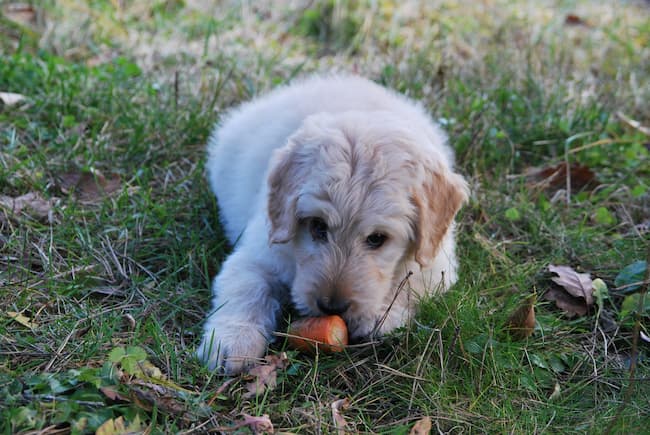
Another great option is to remove the entire core of an apple using an apple corer, and then stuff it with natural peanut butter.
Dehydrated sweet potatoes also make chewy, healthy treats. They're fully digestible, high in vitamins and minerals (including beta-carotene), low in fat, and can benefit Rascal's digestive system.
Home dehydrators can be fairly inexpensive and allow you to dehydrate meat, fruit and vegetables for all the family. You can also use your oven. If you'd like to learn more about this, check out these super easy dehydrated dog treat recipes.
Or look for high quality, ready made options like Crump's Naturals Sweet Potato Chews
Whimzees
A bit different from all the suggestions featured above, these are still all natural chews that can be a good addition to your pup's chewing activities.

Whimzees are dog dental chews that are made with all natural ingredients. They're 100% digestible and are safe chews that can be enjoyed by puppies and dogs of all ages.
Because they're edible, a maximum of one treat per day is suggested, to prevent tummy upset. Whimzees are available in a different shapes and sizes, all with textures and grooves which make them good at keeping teeth clean and gums healthy.
One caveat is that these are not particularly long lasting or durable, and I'd definitely recommend making sure you pick the right size for your pup. If the treat is too small it could be a choking hazard.
Tips for choosing natural puppy chews
Check the ingredients list and origin
Whichever type of natural puppy chews you decide to get for your little Rascal, always check the ingredients list and origin of the product. You want to be sure that nothing artificial or dangerous has been added, or used in the processing of your chosen treats.

While USA-made treats are always my preference, those made elsewhere can also be safe and delicious, as long as you pay attention to ingredients and processing.
Size does matter
From a safety perspective, bigger is usually better when it comes to natural treats, and in most cases a puppy chew that's a little too big is safer than one that is a little too small.
Most dog chews come in a variety of different sizes, so if in doubt size up not down. Treats that are too small are a choking hazard. It's also easier for Rascal to tear off a chunk, or break off a piece, and swallow it. This can cause damage or a blockage in his digestive tract, both of which are potentially very serious. Large chunks can be an additional choking hazard.
The size thing applies even to bones , antlers, root chews and stick chews, because although they're designed to be chewed on and not eaten, if you choose one that's too small your over-eager pup might just swallow it whole. Which brings us right back to the choking hazard and intestinal damage potential.
Give edible chew treats sparingly
Although the best natural chews for puppies have health benefits and are nutritious and safe, it's always possible to have too much of a good thing! Puppies have delicate tummies, and many of these treats are very rich, so you can see where the trouble can come from.

Antlers, cleaned/sterilized bones (ie without meat on them) and Root Chews generally won't cause tummy upset because and Rascal can chew on them all day long without any problems.
The same goes for large, natural root dog chews. But the edible dog chew sticks of all kinds, and even the yak milk chews, should be given in moderation and the in-between times filled with the non-edible ones.
As with anything different, when offering a new treat go slow, allowing him short play sessions with it at first. Make sure your pup enjoys, and is safe, with his new goodie and watch for tummy upset for a few days to begin with.
Supervision is needed
Whenever your pup is chewing on a treat/toy/chew supervision is necessary (especially if it's a type of treat or chew he hasn't had before). This is simply to make sure nothing goes wrong, such as choking, tearing it up and swallowing large pieces etc.
If your pup or dog is chewing on something hard like an antler or natural bone, there's always the slight possibility that he might bite down too hard and damage a tooth, or hurt his gums, so keeping an eye on him is always a good idea.
Protect yourself and family members
Antlers and chew roots don't generally pose a health risk to pet owners, but some of the other natural treats featured on this page have the potential to do so.
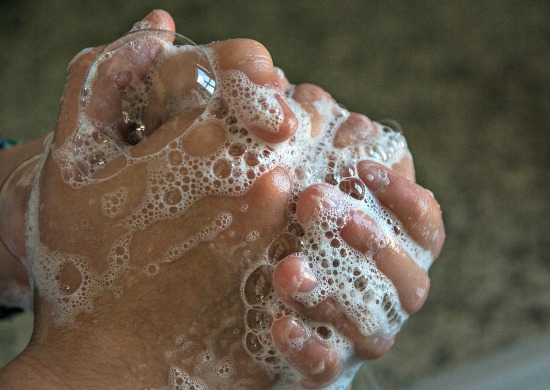
Especially those treats which haven't been cooked, baked or smoked, as these may carry bacteria (similar to that found in raw meat) that won't cause Rascal problems, but could make humans sick if ingested.
The best way to protect yourself is to wash your hands thoroughly after handling treats like bully sticks, hooves, ears and so on, and make sure everyone in the family does the same.
Variety is the spice of life!
Puppies are like children, they can get bored fast... and that can lead to bad behavior! I used to divide my kids toys up into three or four groups and and rotate them every couple of weeks... I do something similar with my dog's toys.
Having at least three different types of natural puppy chews and switching them out every few days helps keep them interesting to them.
Our Favorites!
I've featured what I believe are the best natural chews for puppies on this page. Each one has it's own set of pros and cons, and is more suited (or more attractive to) some pups than others.
Some investigation and experimentation, accompanied by careful supervision, will soon help you figure out which one/s are best for your little Rascal.
With decades of that already under my belt I thought I'd share our house favorites... but bear in mind yours could be entirely different!
They are not in order of popularity because my two boys love them all, and each one has slightly different preferences.
The bully sticks are my least favorite because they're kind of messy and smelly, but hey, the dogs enjoy them so I just go with the flow.
- Antlers
- Yak milk chews
- Root chews
- Bully sticks
- Natural hollow bones filled with peanut butter
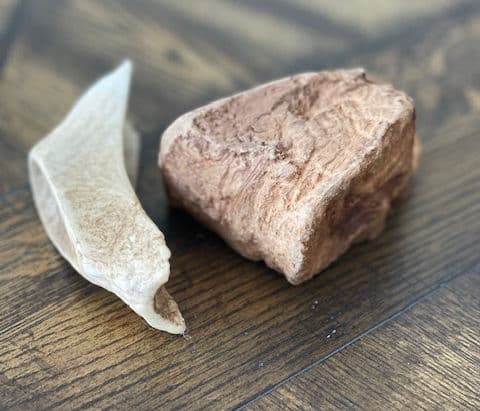 Two favorites in use right now
Two favorites in use right nowWhy are rawhide chews dangerous?
No conversation about natural puppy chews could be complete without mentioning rawhide chews and toys.
Rawhide is a natural product and rawhide dog chews are easy to find just about anywhere.

However, there are three specific dangers associated with rawhide chews.
The first is that most rawhide treats are made from a flat piece of rawhide made into a variety of shapes, none of which are very durable.
Trying to swallow a rawhide chew whole, tearing off a large chunk and attempting to swallow it, or deciding to swallow that last rawhide 'nub' whole are all very real choking hazards.
Secondly, if your puppy or dog does manage to swallow a rawhide chew, or a large piece/chunk of it, without choking, there is then a recognizable danger of it causing an intestinal obstruction as it continues to swell with the moisture in your dog's stomach or gut.
The third danger is hidden within the rawhide chew itself, and in the manufacturing processes it goes through.
Rawhide is exactly what it says it is, raw hide from animals, generally cows, and where it originates, how long it takes before it gets to be processed, and what happens in between can seriously compromise it's safety as something to be consumed.
Rawhide is most often naturally yellow in color, although there is some rawhide which is naturally paler or white.
Manufacturers often 'sterilize' their rawhide to make it look white and the products/processes they use are hazardous to your dog's health because they use bleach and other dangerous chemicals.
Personally I don't ever give my dogs rawhide bones anymore, but if I were to I'd be sure to only choose a high quality USA made product, processed without chemicals or bleach.
You Might Also Like:
- Home
- About Puppy Teeth
- Best Natural Chews for Puppies

